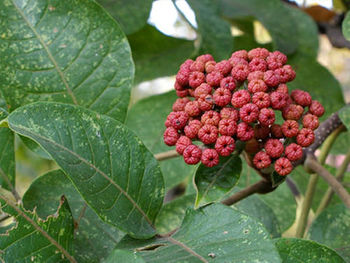Evodia
From Wikiwel
Other Names: Evodia Extract, Evodia Lepta, Evodiae, Evodiae Fructus, Evodia Fruit, Evodiamine, Evodia officinalis, Evodia rutaecarpa, Extrait d’Evodia, E. rutaecarpa, E. officinalis, Gosyuyu, San Cha Ku, Wu-Chu-Yu, Wu-Zhu-Yu.
Evodia is a tree that is native to China and Korea. Evodia fruit, which has a strong bitter taste, is commonly used in Traditional Chinese Medicine. The fruit and root bark are also used as medicine in other herbal practice.
Special Precautions of Evodia
- Pregnancy and breast-feeding: It might be UNSAFE to use evodia if you are pregnant. It contains some chemicals that affects pregnant animals. These chemicals cause the animals’ uterus to contract and also seem to reduce the size of the litter. It’s not known if evodia affects pregnant women, but it’s best to stay on the safe side and avoid use.
- It’s also best to avoid using evodia if you are breast-feeding. Not enough is known about its effects.
- Surgery: Evodia seems to slow blood clotting. There is a concern that it might increase the risk of bleeding during and after surgery. Stop using evodia at least 2 weeks before a scheduled surgery.
- Caffeine interacts with EVODIA
- Medications changed by the liver interacts with EVODIA
- Medications that slow blood clotting (Anticoagulant / Antiplatelet drugs) interacts with EVODIA
- Theophylline interacts with EVODIA
Benefits and uses of Evodia are
- Evodia is used for digestion problems including diarrhea, dysentery, nausea, vomiting, abdominal pain, gastroesophageal reflux disease (GERD), stomach ulcers, and lack of appetite.
- It is also used for obesity, headache, high blood pressure, congestive heart failure (CHF), infections caused by viruses, Alzheimer's disease, cancer, and fluid retention.
- Women use evodia to prevent pregnancy, start their periods, and treat bleeding after giving birth.
- Evodia root bark is used for infections caused by parasites such as tapeworm and pinworm.
